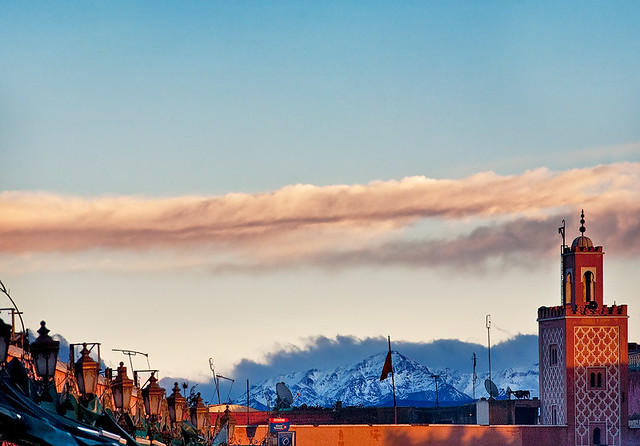Long reads — special Morocco edition
I did not put out Long Reads like last week. Will try to make this new feature work.
But I've accumulated a few links to long pieces of journalism and think tank reports on Morocco, and having generally felt guilty that I don't write about Morocco as much as I should (for instance, the UN recently stated that torture in Morocco "is systematic in Morocco for cases involving anti-government demonstrators and those accused of terrorism", belying the idea of a radical improvement under Mohammed VI.) I thought I'd highlight them here.
1. Averting a Moroccan revolution
Amin Alsaden, in a report for the German Institute for International and Security Affairs, writes about the "The Monarchy’s Preemptive Spatial Tactics and the Quest for Stability" — that's a mouthful! It focuses on the built environment and its role in the monarchy's discourse on "tradition and modernity"
The 2011 protests show clearly, however, that a large swath of the population is anything but content. Seen against the backdrop of proliferating new infrastructure and building projects, the protests indicate that the “success” of the Moroccan path to regime reform may be in peril if it cannot deliver on social issues.
This potential failure needs to be juxta- posed with contemporary popular senti- ment that favours stability. Many Moroc- cans are convinced that they are better off with the current regime rather than ending up with total chaos and an unknown future – a view that can be attributed to their ob- servation of regional events, such as the Syrian uprising. This implies a decrease in internal pressure on the monarchy to live up to its promises, at least for the time being.
2. The Reform of the King
James Traub, writing in Foreign Policy, strikes a markedly more skeptical tone than he did last August:
Morocco has, in short, the same social, economic, and demographic problems that led to mass protests elsewhere in the Arab world. Still, the king's supporters persist in believing that February 20 was no more than a flash in the pan: The people wanted reform, and the king gave it to them. But the people who took to the streets wanted jobs, a better life, and an end to the corrupt bargains struck by members of the makhzen. And it's unlikely that the Benkirane government will be able to deliver those things. "Moroccans believed in Benkirane," says Salem. "But once they see that nothing concrete has changed, the movement will return."
You have to wonder how long the protesters will continue to make a special exemption for the king. February 20 tore away the curtain of propriety that had protected the monarchy. The world of privilege that has wrapped itself around the king like so many layers of glittering nacre has now been exposed to the public. For years, the king benefited from a profound cognitive dissonance: The palace is rotten, but the monarchy is benevolent. That, as Tazi, the opposition businessman, puts it, is the "Freudian way" of dealing with criticism of the father in Morocco's deeply paternalistic society. But the patriarchy is losing its moral force; people will no longer accept what they used to accept.
Constitutional reform, by itself, will not be enough. Morocco cannot become a democracy as long as it has both a government and a feudal court that claims not to govern and therefore is unaccountable to the public. Morocco may be exceptional, but it cannot be amphibious. Hicham, the king's cousin who is a public advocate for a democratic Morocco from his exile in the United States, says that he has come to the unhappy conclusion that incremental reform will not succeed. "The monarchy cannot open up without blowing open," he says. It might survive, but it would have to, as he says, "kill the makhzen." You can have a country governed by deference and awe, or a country governed by equal citizens. There is no third way.
The piece was accompanied with a slideshow highlighting wealth disparities. Journalists are often taken in with the charm of Morocco and the polish of regime spokesmen. Glad to see James correct his earlier take.
3. Not enough change in Morocco
This excellent piece in Le Monde Diplomatique (subs.) this month, by Aurel and Pierre Daum, starts off in the backwaters where, over the last year, multiple riots and social protests have taken place. It focuses on the Rif in particular:
Did they ever refer to the king? “Never directly,” said Jawad S, 26, a technician we met with 10 of his friends at a café in Ait Bouayach, on the Monday after the regular Sunday protest in which 200 men took part. (A few female unemployed graduates later demonstrated outside the courthouse in Al-Hoceima where a friend was being tried, but they stood apart on the pavement.) “We don’t want to get rid of the king,” said Jawad. “We just want one like they have in Spain or the Netherlands.” (In fact the monarch in the Netherlands has been Queen Beatrice since 1980.) They were prepared to keep the king as long as he “stops interfering in the economy” (meaning that his immense wealth — derived from the shares he automatically gets in big state companies — should be fairly distributed). They have all read at least extracts from Le Roi Prédateur (The Predator King) by Catherine Graciet and Eric Laurent (banned in Morocco but available on the internet), which exposes the financial affairs of the king and his entourage.
The bad news for Moroccans is that Mohammed VI is no Juan Carlos.
Update: One more different type of long-read — this exhaustive testimony by Moroccan blogger Larbi of the protests that took place in Casablanca last month and subsequent trial and conviction of participants.

